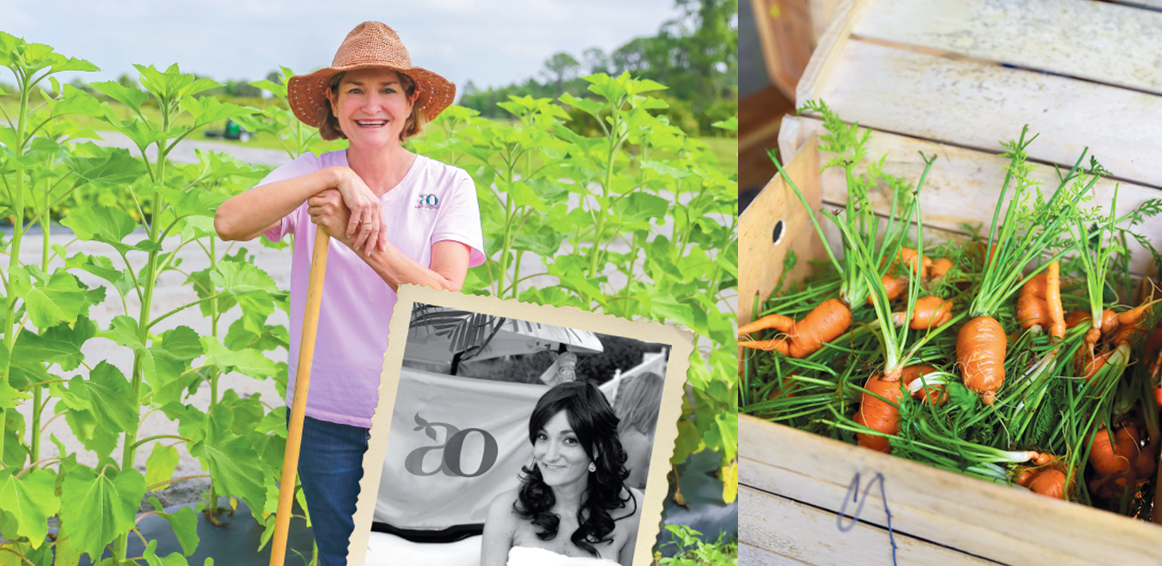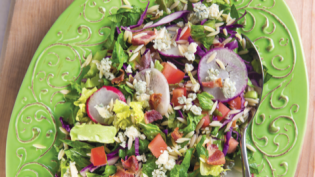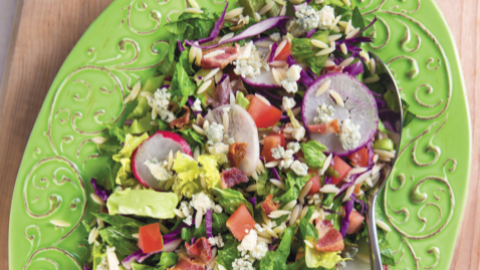Sowing the Seeds at Aloe Organics Farm
Alison Hall Nelson died March 7, 2012, before the first seeds of her legacy were sown. But the memory of the young woman—described as funny, feisty, and full of life—will live on for generations through the vegetables growing at Aloe Organics.
At just 28, Allison—or “Aloe,” as she was called by her husband, David—was faced with a shocking diagnosis: Stage 4 metastatic breast cancer. Less than three years later, the disease claimed her life.
Until her diagnosis, other than a persistent cough, the active fourth-generation attorney seemed healthy. Like many women her age, prior to her diagnosis Allison was not focused on nutrition. But her doctors stressed its importance on her quality of life and possibly her prognosis, so Allison made changes, following a list of recommended foods, cooking and experimenting with new veggies. “Allison said she realized that she had the biggest fight of her life coming and knew she needed to make a change,” says Katie Rauch, one of Allison’s high school girlfriends.
Allison spoke openly to family of her desire to leave a lasting impression and help others with cancer. Out of these conversations evolved the idea of an organic farm, where the produce grown could be sold and, more importantly, donated to cancer patients. Without hesitation, her family dedicated a portion of its 6,000-acre cattle ranch in Arcadia, and Kay moved quickly to make her daughter’s vision a reality. With no experience or a sense of where to begin, she enlisted the help of organic farmers Chris and Eva Worden of Worden Farm, who, among many other tasks, identified a plot on the ranch nestled between old Florida hammocks. Allison liked the spot they chose.
Other family members jumped in to help. Her sister Emily, the marketing director at an organic farm and food processor in Oregon, took on social media and marketing efforts; younger brother Miles, now a nuclear engineer, was Aloe’s first salesman. On the Wordens’ recommendation, Kay hired Farm Manager Scott Schroeder, who, despite a lack of formal farming experience, had the skills the Halls needed. “When [the Wordens] called, I said ‘But I am not a farmer,’” says Schroeder, “and they said ‘Well, we are and we’ll train you.’”
Aloe Organics is a now thriving six-acre certified organic farm. Schroeder attributes many of the farm’s accomplishments to a greater influence. Although he never met Allison, he says her presence on the farm is strong. “Kay says Allison’s here looking over us, and I agree,” he says, referring to Allison’s mother, Kay Hall. Kay is humble about her dedication to her daughter’s legacy, but she is the driving force keeping Allison’s vision alive.
On the first anniversary of Allison’s death, Kay made the farm’s inaugural donation to the Center for Building Hope in Lakewood Ranch. She does so every Thursday during growing season.
“I didn’t really know how [Allison] wanted me to do the donations,” Kay explains. “More than anything in this world, she wanted kids, so it just came to me one day... I needed to give good, healthy produce to children with cancer.” Now, every week, as families of children with cancer fill their bags with Aloe’s produce, Allison’s dream is realized. “Because of the farm and what it does, no one will ever forget her, or her face,” Emily says.
The Center's Program Director Andrea Feldmar sends a weekly reminder to 35 families about the donation. Because treatment is expensive, she says many families cannot afford organic vegetables on top of the medical expenses they incur. Aloe grants these families the critical opportunity to manage what goes into their bodies. “It’s a mixed blessing,” says Feldmar, “but the knowledge that (Aloe) is helping improve their quality of life, and helping them (control) what they put into their systems, so they can make it to baseball practice or ballet lessons, is huge.”
Any unclaimed produce is offered to Survivors Rock, a support group for women in their 20s, 30s, and 40s. Anything left after that trickles out to additional Center programs.
Kay and Schroeder estimate they donate about 20% of the farm’s weekly harvest. They aspire to give even more.
To cover operating costs, the rest of Aloe’s weekly harvest is sold to Sarasota restaurants, including Pomona and Simon’s, and groceries, including Detweiler’s Farm Market and Morton’s Market. The farm also fills orders for food service companies like Suncoast Food Services.
Although the farm is still young, it already offers an immense variety of gorgeous produce, and is constantly experimenting in the field. Kay and Schroeder say they’ll continue to expand Aloe’s product and would like to grow custom for local chefs, as well. “The more [Aloe] can sell, the more it can do for the community and the families with kids who have these diseases,” says Rauch.
Family is a recurring theme in the farm’s daily operations. The Aloe Organics team— Kay, Schroeder, Assistant Farm Manager Pete Wood, and two others farmhands—feels
much like one itself. “Allison would be so excited to know that it actually happened,” says Emily. “She never thought it would be here today. And to see everything that they’ve done ... she would be touched.” Emily is especially proud of her mother.
Kay Hall may not have ever imagined herself a farmer, but watching things grow in her daughter’s name has become her passion. Though she daily faces the tragedy of losing a child, she believes the legacy Allison left with her family for future generations is the greatest gift.
“There is no doubt to any of the family that Allison knows and blesses the farm,” Kay says. “With every beautiful vegetable we pull from the ground, her spirit soars!”
To find out more about our farm and our donation program please contact us at: aloeorg.com; facebook.com/AloeOrganics.






